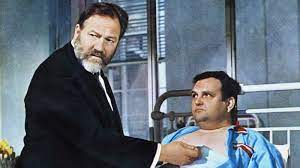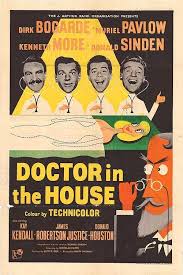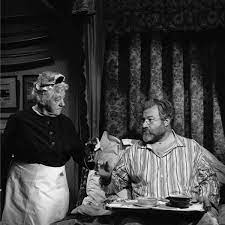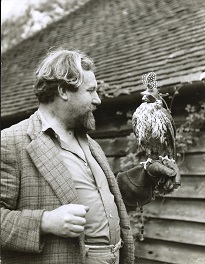
© Northern Ireland Screen / Focus Features / Universal Pictures
Kenneth Branagh has seemed the embodiment of classical, theatrical Englishness for a long time – at least since his 1989 film adaptation of Henry V, in which he raged “Cry ‘God for Harry, England and Saint George!’” Meanwhile, over the years, I’ve enjoyed shocking people by pointing out to them that Branagh isn’t actually English. He was born in Belfast, Northern Ireland, in 1960. He and his family left there for England in 1969, shortly after the outbreak of the Troubles. He ended up in Berkshire, where he dropped his Belfast accent and ‘acquired received pronunciation to avoid bullying.’ Thus began the plummy-voiced Branagh we know today.
In fact, Branagh’s early life wasn’t dissimilar to mine, for I was born and brought up in Northern Ireland until the age of 11, when my family moved to the town of Peebles, in the Borders region of Scotland. I was a couple of years older than Branagh was at the time of moving and couldn’t shed my accent so easily – not that I needed to, because although my new classmates in Peebles sometimes took the piss out of the way I spoke, I was never bullied. Come to think of it, acquiring ‘received pronunciation to avoid bullying’ probably wouldn’t have been a good policy at Peebles High School. Folk would have picked on you more for sounding like a posh tosser.
Before Branagh made a name for himself as the star, director and adaptor of Henry V, I’d known of his Northern Irish connections because I’d seen him appear in a quartet of TV plays written by the Northern Irish dramatist Graham Reid. These were Too Late to Talk to Billy (1982), A Matter of Choice for Billy (1983), A Coming to Terms for Billy (1984) and Lorna (1987), and were about the tribulations of a working-class Protestant family in Belfast, the Martins. The Martins’ problems aren’t caused by the Troubles but by their own flawed, damaged and abrasive personalities. The widowed father Norman (James Ellis) is an unrepentant hard man, incapable of showing his gentler feelings, while his eldest child and only son Billy (Branagh) is embittered about how Norman treated his late mother. It’s left to the eldest daughter, the mild-mannered Lorna (Brid Brennan), to act as a surrogate mother to the family’s younger children. During the plays, unexpected things happen – Norman mellows under the influence of a woman he forms a relationship with while working in England, Lorna develops some unexpected steel and Billy, dismayingly, begins to show some of the worst traits of his dad. In the four plays Branagh had no problem readopting his old Belfast accent, so I was surprised when a few years later I went to the cinema and heard him speaking fluent Shakespeare in Henry V.
Branagh has revisited his Belfast roots with his latest movie Belfast, which was released in the USA last year and has just been released in Britain. Inspired by Branagh’s experiences during the late 1960s, it tells the story of another working-class Protestant family, one less dysfunctional than the Martins in the Billy plays: a couple simply entitled ‘Ma’ (Catriona Balfe) and ‘Pa’ (Jamie Dornan), and their older son Will (Lewis McAskie) and younger son Buddy (Jude Hill). Pa spends his working life in England and is considering moving his family over to live with him, something that doesn’t appeal to Ma and the boys. “I know nothing else but Belfast,” she protests. For one thing, they have strong family ties in the city, most notably Pa’s parents, the droll Pop (Ciaran Hines) and stern but kindly Granny (Judi Dench). Then the Troubles erupt and Protestant paramilitaries led by local thug Billy Clanton (Colin Morgan) chase the Catholic families out of their neighbourhood. As the paramilitaries’ grip on the area tightens, Pa falls foul of Clanton and it becomes clear that, like it or not, his family will have to leave too.

© Northern Ireland Screen / Focus Features / Universal Pictures
This basic plot could have made Belfast a grim film, but it’s a funny, good-natured one because these events are seen through the eyes of little Buddy. They have to compete for attention with all the things that matter to a normal nine-year-old boy – things ranging from pursuing your first love to getting initiated into the local kids’ gang, from making trips to the cinema to bonding with your granddad.
Belfast left me with mixed emotions. On one hand, I found it annoyingly overstated in places. On the other, I generally found it rather moving. I’ll explain my conflicting reactions in detail, starting with the negative ones.
I have to admit that until now Henry V is the only film by Branagh that I’ve enjoyed. I wasn’t impressed by his later adaptations of Shakespeare, like Much Ado About Nothing (1993) and Love’s Labour’s Lost (2000), and I hated his version of Mary Shelley’s Frankenstein (1994). They seemed shrill and over-the-top in both their acting and their visuals. Originally, I thought this was because Branagh didn’t have confidence in the original texts by Shakespeare and Shelley to capture the attention of modern film audiences. He felt obliged to make them as bombastic as possible, pumping them up with the cinematic equivalent of steroids – operatic performances, hammy humour, fast-moving camerawork and so on. Nowadays, though, I just think the problem is that Branagh, basically, is a theatrical man. When you’re on a stage, performing for a live audience, everything has to be big – the voice projection, the gestures, the general drama – in order to be seen and heard. But what’s effective from a distant stage often seems unsubtle when it’s projected in fine detail onto a large movie screen. And that’s the impression I sometimes got with Belfast.
In its plot machinations, visuals and soundtrack, there are some broad brushstrokes indeed. You get heavy-handed pieces of comedy, such as when Buddy cheats at his homework in order to get placed at the desk beside the girl he fancies at school – their teacher positions the pupils from the front to the back of the classroom according to how good or bad their marks are, and Buddy’s sweetheart, the brightest kid in class, is right at the front. (From a teaching point of view, wouldn’t it be sensible to have the less able kids at the front, so you can keep a close eye on them, and the smart ones at the back?)
Meanwhile, Branagh shoots the film in black and white but inserts colour at certain moments. These are when Buddy’s family go to the cinema. Although the auditorium is filmed in monochrome, what’s happening on the screen – action from Hammer’s One Million Years BC (1966) and the movie version of Roald Dahl’s Chitty Chitty Bang Bang (1968) – appears in its original, glorious technicolour. As a metaphor for how the cinema transports Buddy out of his black-and-white everyday existence and into the colourful dreamworld of the movies, this is pretty clunking.

© Northern Ireland Screen / Focus Features / Universal Pictures
By far the worst offender, though, is a scene where Pa confronts Billy Clanton on a street. Clanton is holding his family at gunpoint and there’s a squad of British Army soldiers looking on, pointing weapons at everybody. I know we’re meant to be viewing this through Buddy’s eyes. But still, it seems crass and cheesy that at this deadly-serious moment Tex Ritter starts singing Do Not Forsake Me Oh My Darling from the classic 1952 western High Noon – which Buddy has recently watched on TV – on the soundtrack. Billy Clanton, incidentally, was the name of one of the villainous Clanton Gang who took on the Earp brothers and Doc Holliday during the gunfight at the OK Corral, another touch that’s a bit too obvious.
All that aside, however, I have to say I enjoyed Belfast. It’s nice to see a film about Northern Ireland that isn’t primarily about terrorism, extreme religion or extreme politics, and that focuses on believable, relatable people who are just trying to get on with their lives. It also contains a lot of humour, something that’s usually in short supply in movies about Northern Ireland, even though I remember knowing many funny, witty characters when I lived there. (Ciaran Hines’ genial, good-hearted Pop, who manages to be on Buddy’s wavelength without ever patronising him, initially seemed too good to be true – but again, I realised, I’d known several old guys like him during my childhood.)
Branagh conveys the idea that, as a kid in Northern Ireland, the popular culture of the time enthused you just as it enthused kids in more ‘normal’ societies, and influenced you as much as (if not more than) the riots and bombings that were happening not far from your doorstep. Thus, we see Buddy dressing up like a cast-member of Thunderbirds (1965-66), watching Star Trek (1966-69), playing with Subbuteo and James Bond toy cars, and reading the Marvel comic The Mighty Thor, which allows Branagh to sneakily reference the 2011 movie Thor, which he directed. (I don’t know how easy it was to access Marvel comics in Belfast in 1969, especially as Marvel’s British subsidiary Marvel UK didn’t begin operating until 1972. Still, I remember finding an American edition of The Avengers in Enniskillen in the early 1970s, so I guess it was possible.)
If there’s one thing I find unconvincing about the characters, it’s that the tribal symbols that existed in Northern Ireland’s Protestant and Catholic communities, even in 1969 before the Troubles hardened people’s senses of identity, are absent. There’s little said or shown about being British or Irish, about Union Jacks or tricolours, about the Orange Order or Gaelic Athletics Association. Actually, at a few points Buddy’s relatives describe themselves as ‘Irish’ (“The Irish were born for leaving – otherwise, the rest of the world would have no pubs…” “All the Irish need to survive is a phone, a Guinness and the sheet music to Danny Boy…”), although I expect most Belfast Protestants would call themselves ‘British’. Compare this with a scene in Graham Reid’s A Coming to Terms for Billy when Norman Martin’s two youngest daughters discuss, unenthusiastically, the prospect of their dad taking them to England. When one points out how disliked the Irish are in England, the other retorts, “We’re not Irish. We’re Protestants!”
Still, Belfast definitely shows that Branagh’s heart is in the right place even if, occasionally, his plotting and filmmaking instincts aren’t. The black-and-white cinematography is gorgeous and his use of classic Van Morrison songs on the soundtrack – Warm Love, Jackie Wilson Said, Bright Side of the Road, Days Like This, Carrickfergus and, inevitably at the end, The Healing has Begun – is a reminder that however much Van the Man has degenerated these days into a curmudgeonly, whinging old fart who’d pick a fight with his own shadow, he did, once upon a time, record some wonderful music.
And, ultimately, Branagh shows that despite the terrible things that have gone on there, Northern Ireland is a place that exerts a powerful hold on your affections. This is illustrated in the scene where Ma and Pa break the news to Buddy that they’re all going to leave Belfast and move to England. Poor Buddy promptly bursts into tears.
I remember when my mother took me aside in 1976 and told me that we were going to move to Scotland. I reacted in exactly the same way.
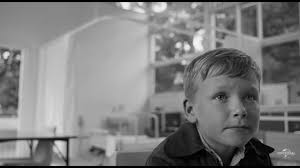
© Northern Ireland Screen / Focus Features / Universal Pictures

